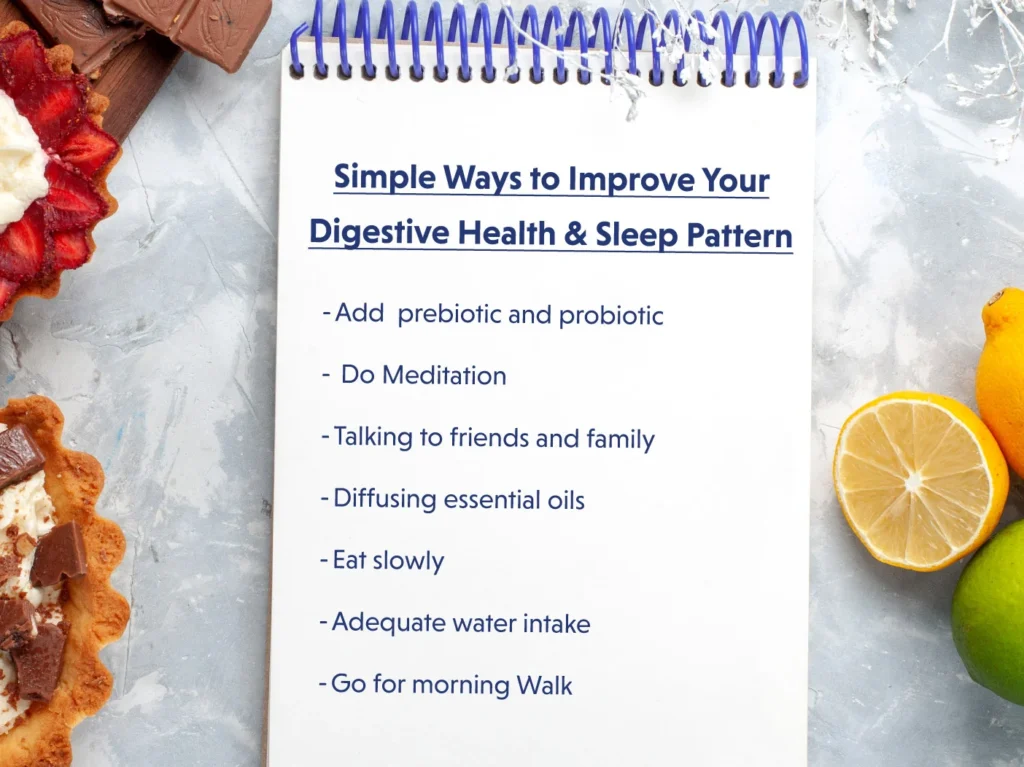A number of researches have proved the bidirectional relationship between our gut and sleeping pattern. Gut is mainly defined by the trillions of bacteria and other microscopic organisms that reside in it. This collection of beneficial bacteria is termed as gut microbiome. Any change in the diversity of gut microbiome will therefore bring change in body’s physiology.
The intestinal health is perceived to have a close connection with our brain functioning. This is defined as the gut brain axis that helps transmit signals with the help of vagus nerve. Therefore, if you will maintain your digestive health, a normal sleep pattern is induced by stimulating the release of important chemical messengers in the brain such as, serotonin and dopamine. Similarly, an unhealthy gut can cause insomnia or poor sleep, which further leads to fatique. So, when there is bacterial inflammation in the gut, your sleep will be affected as well.
HOW ABNORMAL SLEEP PATTERNS AFFECT OUR DIGESTIVE HEALTH
We have always been advised to ensure sufficient rest for overall health benefits. Getting adequate sleep makes us feel alert, perform efficiently, have normal reaction time and consolidate learned information. Our bodies should also follow consistency and predictability, meaning we should sleep and wake up around the same time each day. If a healthy sleep pattern is not followed regularly, it will adversely affect the digestive health.
- Increased intestinal permeability
There is arousal of stress due to inadequate sleep. Not getting enough sleep imbalances the hormones as it stimulates the release of stress hormone, cortisol. This sudden rise in stress increases the intestinal permeability also known as leaky gut. In this situation, the food particles and toxins crosse the gut lining and enters into the bloodstream. This further leads to issues like bloating, inflammation, stomach pains, food sensitivities and gut microbiome changes.
- Disturbs the digestion and absorption process
You shouldn’t eat within three hours of going to bed as it burdens your digestive tract. Therefore, digestion and absorption of food while sleeping is an unhealthy process and keep you up.
Also, when you are sleep deprived, certain hunger controlling hormones can go haywire and lead to increased appetite. Not to ignore that when you are tired, you tend to opt for unhealthy diet for quick energy boosts. These can be processed carbs, sugar and trans fats. All these factors thus, negatively impact your gut.
- Leads to medical problems
The longer one is sleep deprived, the bigger impact it has on their digestive health. Some such chronic health issues are tyer-2 diabetes, obesity, high blood pressure, heart problems and even cancer. One major reason that makes you feel restless at night will be prolonged stress.
HOW DIGESTIVE HEALTH AFFECTS SLEEP
It is a proven fact that disrupted gastrointestinal microbiomes play significant role in development of mental disorders such as insomnia and circadian disturbance.
- A leaky gut
In this condition, the gut lining fails to control what passes from intestine into the bloodstream.
- This results in a heightened immune response that leads to increase in inflammation and levels of cytokine, the inflammatory messengers. Thus, this becomes the major cause of insomnia.
- The pain associated with inflammation can further disrupt the sleep.
- Release of cortisol, a stress hormone also makes it difficult to fall asleep and stay asleep.
- Gut microbiome composition
Growing evidence suggests how a disturbed gut microbiome composition can influence the quality of your sleep. This effect on mental and physical health is possible through the gut-brain axis which reflects the bidirectional relationship between gut and brain.
Over 50% of patients suffering with metabolic disorders have depression, anxiety and sleep problems in the long run. Therefore, we can improve the diversity of our gut microbiota through diet modification which will further improve our sleep.
WAYS TO IMPROVE BOTH DIGESTIVE HEALTH AND SLEEP PATTERN

As we all are now aware of the fact that, our gut and mind have a bidirectional relationship. Hence, improvement needed in one aspect demands modification of the other.
- Alter the diet
Adding a prebiotic and probiotic to your diet can help improve your gut health. Prebiotics are the fibers that provide food to the beneficial bacteria of the gut however, probiotics are the live bacteria that mimic the existing good bacteria. Therefore, introducing these will enhance the gut microbial composition and overall health of the individual. Example of some high fiber foods are legumes, whole grains, vegetables, nuts and fruits. However, dietary sources of probiotics are kimchi, saurkert, yogurt and kefir.
It is best to speak with a healthcare professional when choosing a probiotic or prebiotic supplement. Probiotics are not recommended for those having a severe illness or weekened immune system.
Certain food items also need to be eliminated from your diet as they may be triggering the symptoms such as
- Bloating
- Acid reflux
- Abdominal pain
- Diarrhea
- Fatique
- Nausea
- Lower stress levels
Chronic high levels of stress are hard on your body especially, your gut. Therefore, you need to learn about some ways to control your stress.
- Meditation and mindfulness
- Practice yoga
- Massage
- Morning walk
- Talking to friends and family
- Diffusing essential oils
- Laughing
- Eat slowly
Chewing your food thoroughly and eating small meals can aid your digestive processes and lower the chances of developing obesity and other metabolic disorders. Thus, you will maintain a healthy gut which will be further enhanced if you make healthy choices.
- Adequate water intake
An adult is advised to drink at least 8 ounces of water in a day. Water is not only essential for digestion of food but, also helps in absorption of nutrients and excretion of waste thus avoiding constipation.
- Adequate sleep
Prioritize on getting minimum 7-8 hours of sleep every night. Sufficient amount of uninterrupted sleep will positively impact your digestive health.
CONCLUSION
Lifestyle and dietary changes may definitely affect not only your gut but the overall health. Hence, self monitor your health regularly and enjoy a happy living.
Download the JOYSCORE APP to experience a joyful life and healthy life.
Download on the Appstore
Get it on Google Play



